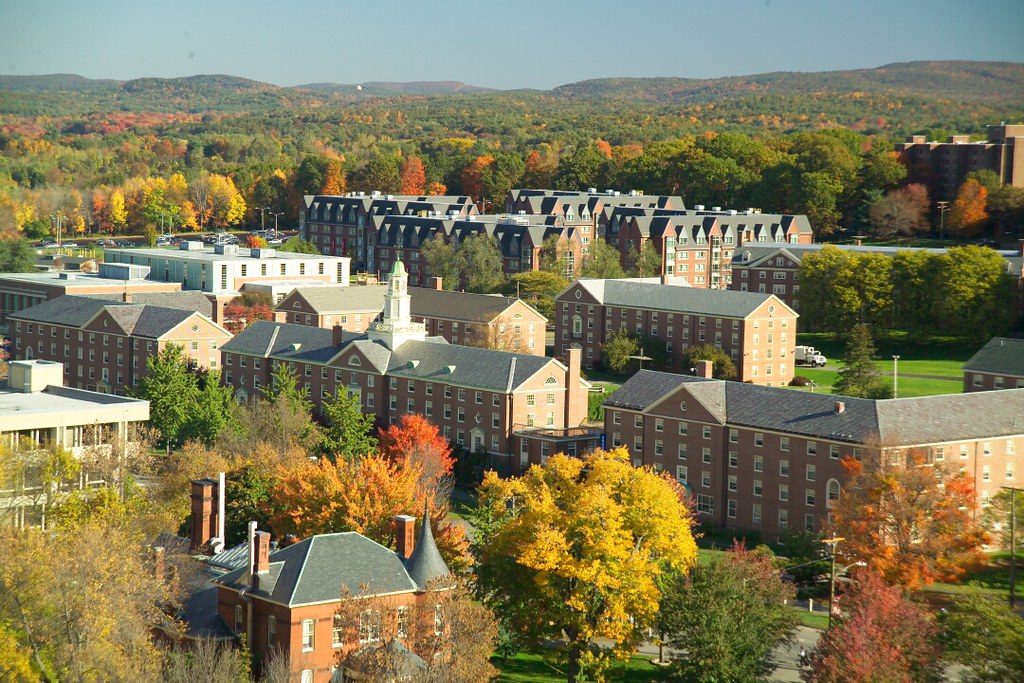Opinion: Amherst Residents Petition UMass to House More Students on Campus

UMass. Amherst dormitories. Photo: flckr.com.
A group of Amherst residents has created an online petition requesting the University of Massachusetts to house significantly more students on campus and asking the town to ensure that housing is prioritized for year round residents..
We invite Indy readers to both sign the petition and to share it with friends and neighbors on your listservs and on social media. You can sign the petition here.
The petition states:
We, the undersigned residents of Amherst, support the petition below asking the University of Massachusetts to make a commitment to house significantly more students on campus, in order to ameliorate the housing crisis for year-round residents of Amherst, and asking the Town of Amherst leadership to change its focus from expansion of student housing in town to ensuring that new and existing housing is prioritized for family, senior, low-income, and workforce residents.
The housing crisis here is especially urgent in that our year-round resident population has now dwindled to approximately 13,000, less than 1/3 of the town’s total population of 40,000. With 9,000 students living off campus in Amherst, there is a growing imbalance in the downtown area, the village centers, and the neighborhoods.
October 1, 2025
To UMass Chancellor Javier Reyes, UMass Student Government, Amherst Town Council, and Amherst Planning Board:
UMass Amherst’s new Strategic Plan paints a vision of education, innovation, and community stewardship—but it fails to address the most urgent issue facing our town: the shortage of on-campus student housing.
Because UMass has not kept up with housing demand:
- Amherst’s year-round population has declined to only 13,000 residents out of 40,000, as families lose out to student rental demand and have to leave.
- The elementary school enrollment has declined by half from its peak, as shown in the Housing Production Plan.
- The town’s tax base is strained, while 27,000 students live here for nine months a year without contributing directly to road repairs, public safety, and other services they rely upon.
- Inadequate PILOT (Payment in Lieu of Taxes) contributions leave Amherst covering an array of costs without fair support.
The obstacles to new dormitories have now lessened: public–private partnerships are permitted and student protests have highlighted the urgent need for additional on-campus housing, for example. There is no reason to delay building, renovating, or converting appropriate structures into more housing for students on campus.
We, the undersigned, urge UMass Amherst to:
- Recognize its responsibility to address the housing crisis in Amherst’s downtown, village centers, and neighborhoods.
- Commit to a concrete plan to create significant new on‑campus housing for its students.
- Relieve the pressure on Amherst to provide housing designed for students, so that it can support year-round housing for a year-round population that includes diverse ages and incomes.
Support a sustainable and balanced population, strong schools, and a meaningful, transparent town–gown partnership.
UMass cannot continue to offload this burden onto Amherst. We call on the University to act now, building on-campus dormitories that reflect its values of stewardship, responsibility, and service to the common good.
We call upon the Town of Amherst leadership to change its focus from expansion of student housing in town to ensuring that new and existing housing is prioritized for family, senior, low-income, and workforce residents.

Brilliant! People please sign.
Too bad those at the head of the tables up front during town meeting didn’t listen to the many of us canaries who were warning of the lack of air in the coal mine.
Some (e.g., John Fox RIP and Rolf Karlstrom) went above and beyond civic duty with their research. Sadly, they were swept aside by many who later led the charge to change our form of government.
The subsequent brain drain and unchecked power in the hands of the town council majority has led Amherst to its current state, edging on the collapse of our basic infrastructure and quality of life.